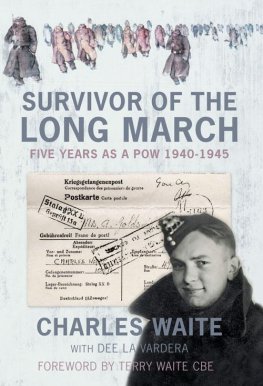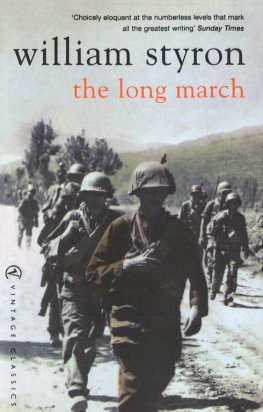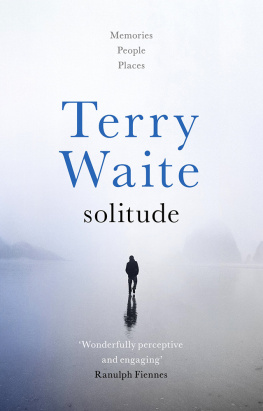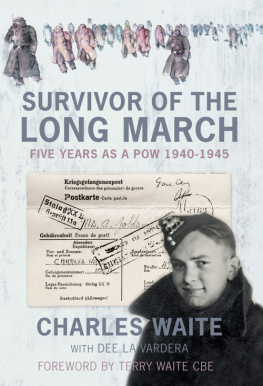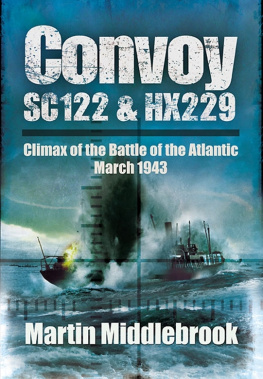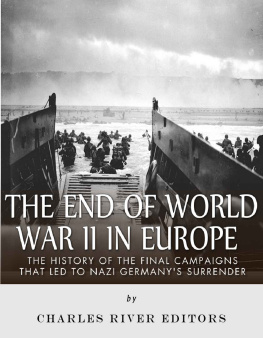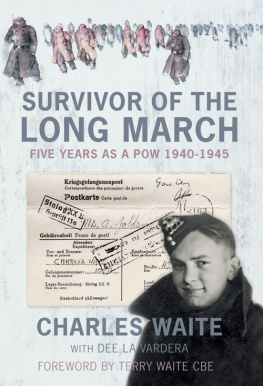Charles Waite
with Dee La Vardera
SURVIVOR OF THE LONG MARCH
Five Years as a PoW
1940-1945

It has been a pleasure and a privilege to help Charles write his life story. When we started in July 2010, I didnt really know if there was enough to fill a book. The more Charles talked, the more he remembered and the more interested I became. Little details were recalled which filled out the picture of his life. Events which had lain buried deep in his mind came to light; some funny, many painful. I thought that everything was worth capturing and recording for others to read so that people would know what he went through and understand what going to war was really like.
After many hours of taped interviews at his home (punctuated by cups of tea and slices of fruit cake) and then many hours on the telephone as I checked details and read chapters aloud to Charles for his approval, we achieved our goal. We laughed a good deal and shed a few tears as we journeyed together on this exploration into his past.
I couldnt have written the book without the help of family and friends (on both sides) and, in particular, those who provided family history, helped with research, undertook proofreading and checked language translation.
A special thank you to Terry Waite CBE for his foreword and to Peter Collyer for the map of Charless route on The Long March.
Many thanks to: Allan M Jones; Vivian Smith; Jimmy Sellar; Robert Neville; Alfred La Vardera; Sue Richards; Adrian Scoyne; Barbara Summerfield; Gill Minter; Phil Chinnery at NEXPOWA (National Ex-Prisoner of War Association); Testimony Films; Manfred Schwarz at East Prussia Archive (Bildarchiv-Ostpreussen.de) and Albert Lipskey; Andrew Gladwell at Heritage Steamers; War Pensions, Glasgow; International Red Cross; National Archives, Kew; Imperial War Museum; Essex Records Office; Museum of London, Docklands and Ancestry UK.
Dee La VarderaCalne, Wiltshire
Although the surname Waite is relatively rare I do not believe that Charlie Waite is a relative of mine although it is quite possible there is a distant connection. Whatever the case may be, we do have a connection of sorts. Charlie became a prisoner of war during the Second World War and I experienced imprisonment very much later in very different circumstances.
The Second World War is now fading from living memory and Charlie is one of the last generation who knew what it was to face the bitterness of that conflict. Many former servicemen have recorded their memories of those years and some have been published. It is important that we have a record if only to remind us of the futility of warfare. Yet Charlies book does more than that. In the true tradition of the Waite family Charlie did not submit easily to his captors. On more than one occasion he showed his rebellious spirit which almost had him charged by the enemy with instigating a rebellion! Fortunately for him the charge was dropped and he faced a lesser accusation, thus living to tell the tale.
Charlie has told his story with a liveliness of spirit and a sharp wit. His book will take its place alongside many other stories of those ordinary men and women who in the service of their country gave so much that we might enjoy freedom today. Although it is often said that we never learn from history those who pick up this volume might take a moment to pause and reflect and recommit themselves to working for peace in todays troubled world.
Terry Waite CBE
I was glad my poor mother couldnt see me. A stinking, flea-bitten, lice-ridden bundle of skin and bones. A walking skeleton. Me, Charlie, her youngest son, nicknamed Bunny because of the way I screwed up my nose when I laughed. But there was nothing to laugh about now on this hellish journey the Long March. My long, long march back home from that God forsaken place in East Prussia where I had spent the last five years as a prisoner of war.
It was January 1945 when we left the camp with our guards, in one of the worst winters of the twentieth century with temperatures as low as -25c. All I knew, it was bloody freezing and every bone in my body was aching from the cold and damp as we marched day after day, month after month, never knowing where we were going. Exhausted and starving, sometimes we pushed our way through snow up to our chests and walked on ice as hard as a steel bayonet. I walked blind, eyes screwed up against the icy winds. Hands burned with the cold, fingers clenched deep inside my greatcoat pockets.
Even though my feet were raw and bleeding, I was one of the lucky ones. I was wearing new boots sent by my mother. They were made from lovely soft leather and I had been saving them goodness knows what for. Luckily, I put them on before leaving camp. I threw the old pair away soon after as I couldnt carry any extra weight. I remember I was wearing the leather belt a fellow inmate had made me out of the tops of discarded army boots. I had to keep pulling it in a few notches to keep my trousers from falling down, as I got thinner and thinner over the four months on the road.
We marched 10km, 20km, even 42km one day, whatever our German guards decided and the conditions dictated before finding somewhere for the night. Maybe some stables, a bombed-out factory or under a hedge. Sometimes we stopped for a few days to clear railway lines and bomb sites. More hard work, with little to eat or drink. Our stomachs hurt from hunger all the time. We were living on raw turnips, a handful of dock leaves, potatoes picked out from pig slurry, fish heads found in a dustbin, anything we could find or steal when the bread ran out. While the snow lasted we sucked handfuls to quench our thirst. When it thawed we looked out for a village pump, drank ditch water or did without.
How is one human capable of doing this to another? Hadnt we suffered enough as prisoners of war, forced to work all those years in dreadful conditions for nothing but watery soup, a crust of bread and a bed in a cowshed? Hating what we had to do, and powerless to do anything except obey orders; and afraid all the time of what might happen next. Keep your mouth shut, your head down and pray to get through it all and see your loved ones again.
At last we were on the move, heading west, we hoped, no idea of the route or the distance that lay ahead. We must have walked something like 1600km during those four months on the road before being rescued by the Americans and flown back to England. From East Prussia, north along the Baltic Coast, across Germany, huge empty landscapes and bombed-out towns, sometimes going in circles and coming back to where we started. Across the frozen river Elbe, south and then north, finally to Berlin.
No plan and no preparation for our evacuation. We left early one morning. Get your kit, were moving. We grabbed what we could: the remains of our last Red Cross parcel, clothes and our precious letters and photos if we could manage to carry them on us. The Russians were advancing so we had them to worry about them as well as the Germans and the Allied bombers above our heads. We were caught in the middle of it all. Nobody cared about us. We were still the abandoned, the left behind, the forgotten. I felt the same sense of fear and loneliness as I did on my surrender to the German Army five years before.
But I survived. Many did not. Men died of cold, exhaustion and starvation on The Long March. I remember helping to bury fellow men in shallow graves, those desperate enough to eat the black biscuits we found in an overturned railway truck and then died a horrible death. When I got back I couldnt tell anybody about what had happened during my years of labour in the camp. I was ashamed. I hadnt done any valuable war work or won any medals; I had no stories to tell of brave deeds; I just did my time.

